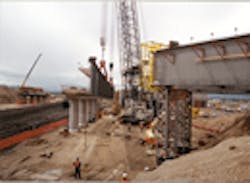Two competing bills being drafted by Senators Dick Durbin (D-IL) and Mark Kirk (R-IL) are clashing over the issue of privatizing transportation infrastructure – with many in the trucking industry remaining opposed to such efforts.
Sen. Kirk’s bill – dubbed the Lincoln Legacy Infrastructure Development Act – seeks to “mobilize,” in his words, over $100 billion in private investment funds to build new roads, airports and railroads by using public-private partnerships without new federal borrowing.
According to the National Surface Transportation Policy and Revenue Study commission, noted Sen. Kirk, current highway, bridge, public transit, freight and passenger rail funding needs are approximately $225 billion per year through 2055, while current spending is less than $90 billion per year. That’s why he said private investment would be required to rectify this critical shortfall in infrastructure funding without increasing taxes
“Our roads, rail, transit and airports are facing unprecedented funding shortfalls,” Sen. Kirk said during a speech at the Union League Club transportation summit this week in Chicago. “We should not further burden working families with higher gas taxes. Instead, we should look to our own economic history to find a solution.”
However, Sen. Durbin’s bill – the Protecting Taxpayers in Transportation Asset Transfers Act – would tack on increased transparency and public involvement before any major transportation projects can be leased or sold in such a public-private partnership arrangement.
“The federal government provides states and local governments billions of dollars to build, maintain and improve transportation projects around the country,” said Sen. Durbin. “The last transportation bill alone provided states with an average of $48 billion per year for upgrades to roads, bridges and mass transit systems. Any deal to sell or lease these assets should be closely examined and include a return on the federal taxpayer investment.”
The American Trucking Associations (ATA) has long opposed any effort to privatize transportation infrastructure, especially highways, as the group believes such efforts would increase costs for users across the board without necessarily offering widespread improvements.
“Schemes such as the privatization and tolling of existing highway infrastructure will result in Americans paying a significantly higher price to access our highway system while receiving less in the form of safe, efficient, and reliable roadways,” said Gov. Bill Graves, ATA president & CEO, in a speech two years ago on the same issue.
ATA spokesman Sean McNally said the group still holds to that position. “We believed that then and we believe it now,” he told Fleet Owner.
Truckstop operators are also concerned about efforts to commercialize highway rest stops, a key tenet of Sen. Kirk’s bill, which specifically would allow such commercialization to provide “additional resources to states with budget shortfalls.”
“At first glance, commercialization of rest stops would seem an easy way for states to generate revenues,” Brad Stotler, director of government affairs for the National Association of Truck Stop Operators (NATSO), told Fleet Owner. “But we believe it would cause significant harm to the businesses at the highway exits, in terms of reduced sales and indirectly reducing truck parking as well.”
A study NATSO conducted last year entitled "Rest Area Commercialization and Truck Parking Capacity" found that truck parking capacity is substantially greater on the stretches of the interstate highway where commercial rest areas are prohibited. Principally, the study found that in general sections of highway in states operating commercial rest areas have two fewer parking spaces per mile.
About the Author
Sean Kilcarr
Editor in Chief
Sean Kilcarr is a former longtime FleetOwner senior editor who wrote for the publication from 2000 to 2018. He served as editor-in-chief from 2017 to 2018.
